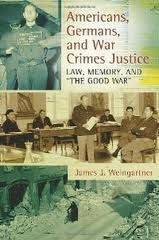Americans, Germans and War Crimes Justice: Law, Memory and the "Good War".

The Geneva Convention addresses the conduct of combatants during declared, armed conflict between the signatory nations. The law was written before WWII and did not consider all the situations that would arise during the six years of the conflict. At war's end, the victors would decide how to interpret the law and how it applied. "Truth, justice and the American way," speeks of fairness and compassion when passing judgment against those that commit crimes against the nation. During the War Tribunals, did the American Way keep lawyers and judges on the path of truth and justice?
Dr. Weingartner examines two cases to demonstrate that perhaps it didn't. On the North Sea Island of Borkum, Germany seven US airmen were captured after making a successful emergency landing only to be murdered by days end. There were 22 accused, but only 16 stood trial. The principal shooter is reported to have been transfered to the Eastern Front where he was KIA. Of the 16 who faced their accusers, there was only one acquital. Four were sentenced to death, but the island's garrison commander, Kapitän Goebell, had his death sentence commuted to life after the intervention of the pope. Others sentenced to lengthy jail sentences had them reduced. The three sentenced to hang, were given a chance to appeal, but failed in their quest.
The second case involves an infantry office part of the occupying unit at Voerde, Germany. Charged with and found guilty of the murders of four German citizens, he would later be released on appeal to live a free life.
Was justice served in both cases, and was it served fairly? Read Dr. Weingartner's book and decide for yourself.
Available at Amazon and Barnes and Noble
Copyright © 1998-2024 486th Bomb Group Association.